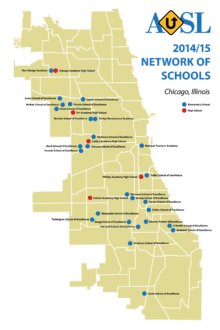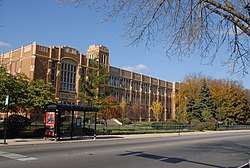Academy for Urban School Leadership
AUSL (Academy for Urban School Leadership) is a Chicago nonprofit school management organization founded in 2001. Today, it manages 31 Chicago Public Schools serving more than 16,000 students. Over 1,045 teachers have graduated from the AUSL Chicago Teacher Residency.[1]
| Founded | 2001 |
|---|---|
| Founder | Martin Koldyke |
| Type | School Management Organization and Teacher Preparation Program |
| Location |
|
| Coordinates | 41.9419°N 87.7763°W |
Key people | Donald Feinstein, Ph.D., Executive Director
Shana Hayes, Managing Director, External Affairs Scott Macdonald, Managing Director, Strategy and Operations Jarvis Sanford, Managing Director, Managing Director, AUSL Network Schools |
| Website | auslchicago |
History
Former Chicago Public Schools (CPS) President Arne Duncan met with financier Martin Koldyke and CPS educator Dr. Donald Feinstein and developed the idea of creating a specialized training program for teachers in urban schools. That led to the development of the Chicago Teacher Residency.[2]
Chicago Teacher Residency Program

The centerpiece of AUSL's efforts is the Chicago Teacher Residency program, a year-long urban teacher training program in Chicago's Public Schools. The 12-month, full-time, paid training program combines teacher preparation, licensure, and a master's degree.
After the training year, graduates commit to teach in an AUSL-managed Chicago Public School for at least four years.[3]
Network of Schools

AUSL manages 31 Chicago Public Schools serving over 16,000 students. AUSL schools operate within the CPS system.[4]

| School Name | Neighborhood | Grades |
|---|---|---|
| Bradwell School of Excellence | South Shore | Pre K-8 |
| Carter School of Excellence | Washington Park | Pre K-8 |
| Casals School of Excellence | Humboldt Park | Pre K-8 |
| Chalmers School of Excellence | North Lawndale | Pre K-8 |
| The Chicago Academy | Dunning | Pre K-8 |
| Chicago Academy High School | Dunning | 9-12 |
| Collins Academy High School | North Lawndale | 9-12 |
| Curtis School of Excellence | Roseland | Pre K-8 |
| Deneen School of Excellence | Greater Grand Crossing | Pre K-8 |
| Dewey School of Excellence | New City | Pre K-8 |
| Dulles School of Excellence | Greater Grand Crossing | Pre K-8 |
| Dvorak School of Excellence | North Lawndale | Pre K-8 |
| Fuller School of Excellence | Grand Boulevard | Pre K-8 |
| Gresham School of Excellence | Auburn Gresham | Pre K-8 |
| Harvard School of Excellence | Greater Grand Crossing | Pre K-8 |
| Herzl School of Excellence | North Lawndale | Pre K-8 |
| Howe School of Excellence | Austin | Pre K-8 |
| Johnson School of Excellence | North Lawndale | Pre K-8 |
| Lewis School of Excellence | Austin | Pre K-8 |
| Marquette School of Excellence | Chicago Lawn | Pre K-8 |
| McNair School of Excellence | Austin | Pre K-8 |
| Morton School of Excellence | East Garfield Park | Pre K-8 |
| National Teachers Academy | Near South Side | Pre K-8 |
| O'Keeffe School of Excellence | South Shore | Pre K-8 |
| Orr Academy High School | Humboldt Park | 9-12 |
| Phillips Academy High School | Douglas | 9-12 |
| Piccolo School of Excellence | Humboldt Park | Pre K-8 |
| Sherman School of Excellence | New City | Pre K-8 |
| Solorio Academy High School | Gage Park | 9-12 |
| Stagg School of Excellence | Englewood | Pre K-8 |
| Tarkington School of Excellence | Chicago Lawn | Pre K-8 |
Results
| Education in the United States |
|---|
|
|
|
- U.S. News & World Report Education ranked Chicago Academy High School in the top ten best public high schools in the city of Chicago.[5]
- Morton School of Excellence has maintained Level 1 status since school year 2010-11. In 2012, Morton School of Excellence surpassed the district ISAT average, the first school to achieve this milestone.[6]
- In 2013, Phillips Academy High School achieved Level 1 status for the first time in its history.[7]
- Every year since 2008, AUSL elementary schools, on average, have surpassed the district's growth on ISAT gains.[8]
Independent Research
The University of Chicago Consortium on Chicago School Research and American Institutes for Research in 2012 released a summary from their independent research evaluating the effect of reform including AUSL schools[9] The study concluded the following:
- Four years after intervention, the gap in test scores between reformed elementary/middle schools and the school system average closed by almost half in reading and by two-thirds in mathematics.
- The teacher workforce after intervention across all models was more likely to be white, younger, and less experienced, and were more likely to have provisional certification than teachers who were at those schools before the intervention.
- Without intervention, the comparison neighborhood schools saw minimal to no increases in average test scores.
- Furthermore, these significant results were achieved serving the same students as before intervention.
- Transformation of an elementary school is a process, not an event. The gains seen in the fourth year vs. the comparison schools are higher than those seen in the first year.
- High schools that underwent reform did not show significant improvements in absences or ninth grade on-track-to-graduate rates over matched comparison schools, but recent high school efforts look more promising than earlier ones.
Criticism
A Chicago Tribune article on AUSL from February 2012 entitled "School reform organization gets average grades" [10] stated that,
Most of AUSL turnarounds score below CPS averages on the percentage of students meeting or exceeding state benchmarks on standardized testing. Those schools that beat district averages have been accused of pushing out their lowest-performing students or those with discipline problems to artificially inflate their test scores.
References
- "About AUSL" http://auslchicago.org/about
- "The History of AUSL" http://auslchicago.org/about
- "Chicago Teacher Residency" http://auslchicago.org/residency Archived 2013-03-18 at the Wayback Machine
- "AUSL Schools" http://auslchicago.org/schools
- "Illinois High Schools" https://www.usnews.com/education/best-high-schools/illinois/rankings?name=&schooltypepublic=y&schooltypemagnet=y&state=il&county=Chicago&schooltypecharter=y
- "2013 Elementary School Performance Policy Report" http://schoolreports.cps.edu/PerformancePolicyReport/Performance_Policy_2013_schlid_ES_610257.pdf
- "2013 High School Performance Policy Report" http://schoolreports.cps.edu/PerformancePolicyReport/Performance_Policy_2013_schlid_HS_609727.pdf
- "AUSL School Results" http://auslchicago.org/schools/results Archived 2013-03-05 at the Wayback Machine
- "Turning Around Low-Performing Schools in Chicago" February 2012 http://ccsr.uchicago.edu/publications/turning-around-low-performing-schools-chicago Archived 2012-05-10 at the Wayback Machine
- "School reform organization gets average grades" http://articles.chicagotribune.com/2012-02-06/news/ct-met-cps-turnaround-20120206_1_turnaround-schools-urban-school-leadership-ausl